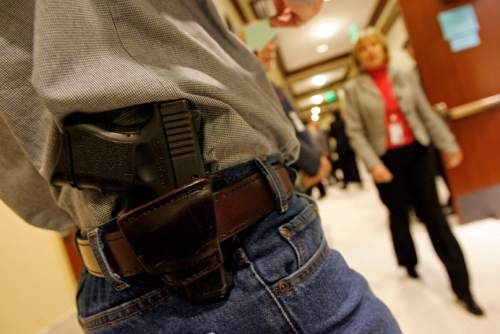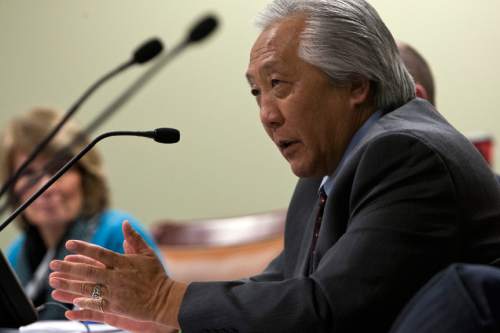This is an archived article that was published on sltrib.com in 2016, and information in the article may be outdated. It is provided only for personal research purposes and may not be reprinted.
Nevada has decided to recognize concealed-firearm permits issued in Utah, the first time in years that the neighboring states have seen eye to eye on the issue, and officials are making high-level overtures to persuade New Mexico to do the same.
The change comes as a result of a decision earlier this year to give law enforcement in other states access to Utah's concealed-weapon-permit database, so officers can verify the validity of a card through their computers.
Previously, officers would have to call a 1-800 number on the back of the permit to check it. An operator is available 24 hours a day to respond to such calls.
The data sharing has at least one gun-rights lawmaker vigilant to ensure firearms-owner information is protected.
Rep. Curt Oda, R-Clearfield, plans to meet with Utah Bureau of Criminal Identification (BCI) officials to ensure that information on the state's concealed-permit holders isn't being shared inappropriately.
"If they do," he said, "I'll have their heads."
On another front, Utah Lt. Gov. Spencer Cox, in a recent letter to the newly appointed New Mexico secretary of public safety, Scott Weaver, is asking that state to reconsider its decision to not recognize Utah's permit, outlining the ways Cox believes the Beehive State's law complies with New Mexico's rules.
"Utah's provisions are adequate and go beyond the requirements of New Mexico's Administrative Code," Cox wrote. "Please consider this letter an official request for reciprocity."
Mark Thomas, director of the lieutenant governor's office, said New Mexico officials reported that Utah had not made a request for recognition of its permit, so the letter was intended to start the dialogue between state officials to see if an agreement could be reached.
With the addition of Nevada, Utah's concealed-weapon permit is recognized in 36 states and remains a hot commodity for out-of-staters. According to statistics from Utah's BCI, the state had 632,276 valid concealed-weapon permits as of March 31 and 425,251 of them — about two-thirds — were issued to out-of-state residents.
Jason Chapman, firearms supervisor for Utah's BCI, said Nevada changed course after the Beehive State provided access to its concealed-weapon database through the National Law Enforcement Telecommunications System (NLETS) earlier this year.
"Part of our law requires that the state have an electronic database to share [concealed-weapon] information with other states," said Mindy McKay, records bureau chief with the Nevada Department of Public Safety. "Utah didn't have that until this year, so now that they have that portion … to be in compliance with our requirements, we do recognize them."
As of July 1, the Nevada Department of Public Safety issued a memorandum formally recognizing Utah's permit.
Oda said the Silver State's objections about Utah not being on the database were bogus from the start and its refusal to recognize the state's permit boiled down to one thing: money.
"[The database] was a small, small, small portion of it," Oda said. "Nevada's original reason was we don't have live-fire training," meaning a student is not required to fire a gun to get a concealed-weapon permit in Utah.
"[Live fire] was also a red-herring argument," he added. "It was about money, because their people were getting Utah permits … so they decided we've got to stop that."
The Utah lawmaker also has been in contact with a legislator in New Mexico about whether that state might recognize Utah's permit.
"There's always the possibility," he said. "I think our training fits in pretty well with their criteria."
Twitter: @RobertGehrke





